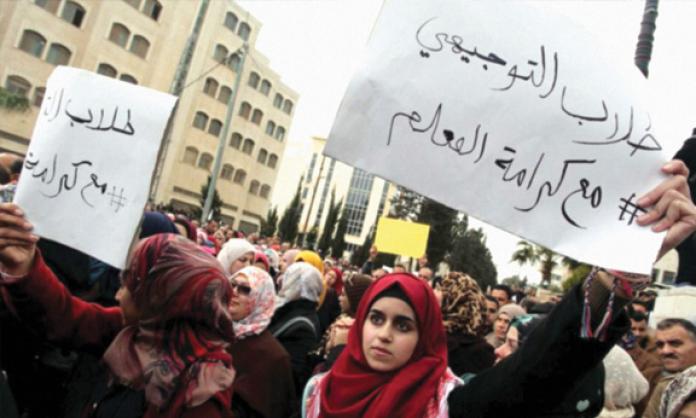Palestinian teachers in the West Bank have taken strike action, which has now morphed into one of largest democratic movements in the territory’s history. Around 20,000 teachers have participated in the last month.
Beginning as a two-day walkout in mid-February, it has closed state schools across the West Bank and pitted teachers against their own official union leaders and the corrupt Palestinian Authority.
They are demanding that the PA honour a 2013 agreement to increase salaries and pay money owed.
The government agreed to implement the agreement progressively if the strike were called off. The teachers refused, insisting that their demands for a new union be accepted. New representatives have already been elected in each district, but the government has not recognised them as a legal union.
On 7 March, more than 3,000 rallied outside the Palestinian prime minister’s office – despite a crackdown by the PA police, who erected checkpoints and issued fines for bus drivers transporting teachers in order to prevent them from arriving at Ramallah.
Palestinian prime minister Rami Hamdallah asked the teachers to be “responsible”, to realise the school year is almost over (the Palestinian school year ends in June) and that the children need to go back to class.
Meanwhile, PA officials on one occasion accused the striking teachers of being agents for Israel and on another as being proxies for Hamas!
The rallying cry of the strike has become “dignity for the teachers”. Samih, an English teacher from Qalqilya, told the Times of Israel: “The teachers are offended by the large increase in salaries for government employees but not for them. When publicly employed doctors and engineers recently went on strike, the PA gave in to their demands. But not us. Not for the teachers.”
Aside from a salary increase, teachers are also demanding that women receive the same benefits as men. “If a female teacher with a pension dies, her salary will stop”, Samih said. “But a male teacher, if he passes away, the salary will go to his wife, or sons and daughters. So it’s not just about wage increases, there is also gender equality. This is also what we mean by dignity.”
The basic salary for public school teachers is barely enough to get by on. Some have to take second jobs to survive financially.
Parents and students have also taken part in protest. “I support the teachers’ strike because it’s about education which is our country’s future”, one student told Middle East Eye.
The movement has brought class struggle in Palestine to the fore.










